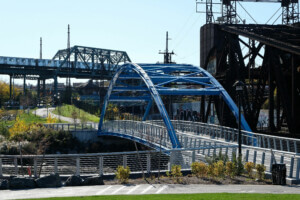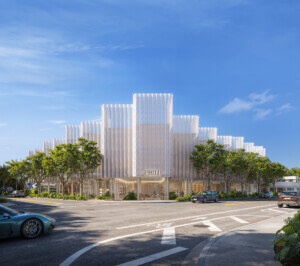The list of American cities seeking to boost social, economic, goals through strategic, philanthropy-assisted investments in public spaces—parks, trails, revitalized downtown cores, and on—just got a little bit longer.
“Designed to demonstrate how strategic investments in our civic assets can advance engagement, equity, environmental sustainability, and economic development in cities and neighborhoods,” the Reimagining the Civic Commons initiative kicked off four years ago with five demonstration cities: Philadelphia, Chicago, Detroit, Memphis, and Akron, Ohio. In that time, each city has launched impressive, transformative public space efforts—some have taken on multiple—including revitalized lakeside urban parks, riverfront pedestrian and bike trails, and ambitious greenway projects that harness one city’s glut of vacant lots.
While philanthropic support—$10 million in total—will continue in each of the initial five cities, the network of cities that, per a press release, are “transforming civic assets to connect people of all backgrounds, cultivate trust, and create more resilient communities” has now grown to ten with the addition of Miami, Minneapolis, San Jose, California; Lexington, Kentucky; and Georgia’s fourth most populous city, Macon.
The timing of the expansion is both difficult and ripe with untapped opportunities. As urban areas continue to collectively look toward a post-COVID-19 future with both eagerness and some trepidation, the need for cities to provide residents with and fund safe, equitable, and accessible public spaces has become even more vital.
Today, we expand our network to 10 cities transforming civic assets to connect people of all backgrounds, cultivate trust & create more resilient communities. @knightfdn @kresgefdn @WilliamPennFdn https://t.co/tpCpstdsvo
— Civic Commons US (@CivicCommonsUS) May 27, 2020
“Amidst the safer-at-home measures during this pandemic, we have seen public spaces—our parks, open spaces and trails—sustaining people in ways we only contemplated a few months ago,” said Dana Bourland, vice president of environment at the JPB Foundation, in a statement. “A growing number of people have now deeply experienced that our civic commons delivers multiple benefits—reduced stress, improved health, a necessary sense of human connection. High quality, well-maintained public spaces are critical infrastructure and they must be available to everyone within walking distance from their home. And they should be at the top of the to-do list for policymakers, leaders and cities.”
Along with the JPG Foundation, John S. and James L. Knight Foundation, The Kresge Foundation, and William Penn Foundation all jointly provide support to the initiative.

Support from Reimagining the Civic Commons will enable the five expansion cities to further dig into existing or nascent public space projects that are in various stages of development and execution. In Lexington, for example, work will focus on building out the Town Branch Commons, a project described as a “two-mile-long ribbon of trails and greenspace that will connect neighborhoods downtown through the central business district, and complete the final segment of an uninterrupted 22-mile trail system.” In Macon, the existing Ocmulgee Heritage Trail will be “expanded into a network of trails and median parks, connecting diverse neighborhoods, reducing barriers to wealth creation and helping support a thriving downtown.” And in San Jose, both Guadalupe River Park and downtown’s Santa Clara Street will be revitalized.
Per the initiative, inclusion in Reimagining the Civic Commons will enable the five new cities to:
- Enhance civic engagement and civic trust through public spaces that are programmed to support authentic neighborhood and community participation.
- Engender support for — and investment in — public spaces within communities as an approach to a more engaged and vibrant community.
- Grow the capabilities of leaders in communities, both in civil society and in public administration, to conceive of, build and program public spaces that deliver outcomes in communities.
“As civic leaders, we are challenged with balancing competing interests, all vying for position within our budgets and policy agendas,” said Dan Horrigan, mayor of demonstration city, Akron. “Reimagining the Civic Commons has allowed Akron to prioritize our public spaces in new ways, making them central to our social, economic and environmental policy goals.”
Head over to the Reimagining the Civic Commons homepage to learn more including how impact is measured in each of the now-10 participating cities. The initiative also maintains a Medium page to share stories from the field.











